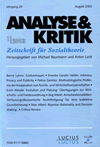Suchergebnisse
"Amartya Sen"
Titel: Ideal Justice and Rational Dissent. A Critique of Amartya Sen’s The Idea of Justice
Autor: Wilfried Hinsch
Seite: 371-386
Abstract: In The Idea of Justice Amartya Sen criticises ’transcendental institutionalism’ for entertaining notions of ’ideal justice’ that are neither necessary nor sufficient for the advancement of justice in the real world. Sen argues in favor of a ’realization-focused’ and ’comparative’ understanding of justice that he associates with the names of Adam Smith, Marx, and J. S. Mill. Conceptions of ideal justice, Sen believes, are useless since in practice we do not need them to advance justice. And they are ’infeasible’ because all conceptions of ideal justice can be reasonably rejected for one reason or other. I shall address both complaints in turn and maintain that Sen’s rigid contraposition of ideal and comparative justice is overstated. It will also be discussed how the institutional focus of ’transcendental institutionalism’ links up with the need for an ideal conception of justice. Finally, some implications of rational dissent about justice and two common strategies to deal with it will be discussed.
Titel: Comment on Wilfried Hinsch: Ideal Justice and Rational Dissent: A Critique of Amartya Sen’s The Idea of Justice
Autor: Mathias Thaler
Seite: 387-393
Titel: Constitutional and Liberal Rights
Autor: Dennis C. Mueller
Seite: 96-117
Abstract: Amartya Sen has demonstrated a possible inconsistency between a (liberal) right and Pareto optimality. Neither Sen nor the subsequent literature have discussed the origin of the rights that lead to the liberal paradox. In this article I examine one possible origin of rights definitions - a constitutional contract agreed to by all members of the community. Constitutional rights are show to be vulnerable to a similar paradox as with liberal rights, but if the writers of the constitution were correct in their choice of actions to protect, such paradoxes will be unlikely and involve small welfare losses when they do occur. The article demonstrates that both the origin of rights and their potential role in advancing the interests of citizens can be explained using a utilitarian/welfarist methodology.
Titel: Rights: Formulation and Consequences
Autor: Amartya Sen
Seite: 153-170
Abstract: The symposium included in this issue of ANALYSE & KRITIK has provided an excellent occasion to re-examine formal as well as motivational issues underlying the so-called liberal paradox. This rejoinder discusses the significance of the new results and analyses, their bearing on the formulation and implications of rights, and also corrects a misinterpretation. Reflections precipitated by the liberal paradox can influence the acceptability of different principles of social decisions, and also the interpretation of 'preference' and 'unanimity'. They also point to some concerns that are relevant in the formation of individual preferences in a society with interdependent lives.

The Relevance of Ideal Justice
2011 (33) Heft 2
Guest-Editors: Lukas Meyer / Pranay Sanklecha
Editorial
Whether and how normative theorising can be relevant for guiding people’s actions is one of the classical questions of moral and political philosophy. Platon’s dialogues Politeia, Politikos and Nomoi provide fascinating discussions on the topic. Recently normative theorists have investigated some aspects of these questions under the title of ideal and non-ideal theorising—relying on a distinction that Rawls introduced in A Theory of Justice (1971) and made use of in his The Law of Peo...